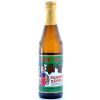Badische Staatsbrauerei Rothaus - Tannenzäpfle
-
ABV:
5.1% -
Bottle Size:
360-ml -
Int’l Bittering Units (IBUs):
32 -
Serving Temperature:
40-45° F -
Suggested Glassware:
Pilsner Glass, Flute -
Hops:
Hallertau, Tettnang
Tannenzäpfle pilsner has a bit of a cult following among many beer lovers in Germany, and after sampling it it's easy for us to see why. Pouring a bright golden-straw color with crystal clarity and a cap of just-off-white foam, it looks inviting in the glass, but it's the aroma that really drew us in. It's got the classic German pilsner notes: an underlying base of pale malt overlaid with brightly earthy, grassy, and lightly spicy noble hops (grown locally in Baden-Württemberg). On the palate, look for a satisfying core of pale but flavorful malt, delivering biscuit and cracker-like notes. Hops are vibrant and full of spicy-herbal and grassy character, along with a wisp of lemon zest. Pilsners are incredibly versatile, being excellent on their own or in the company of various cuisines. Pizza is always a go-to for us with this style, along with schnitzel, sausages, chicken fingers, or backyard barbecued burgers. Prost!
Rothaus Brewery was founded in 1791, in the Black Forest town of Grafenhausen, at the site of the "Zum Rothen Haus" ("To the Red House") inn, which was under the control of the Benedictine monastery of St. Blasien. The man at the forefront of getting the brewery up and running, Fürstabt (Prince-abbot) Martin Gerbert II, was an important historian, musician, professor, and politician who founded, aside from the brewery, the predecessor of the Sparkasse Bonndorf, a chain of German banks in business to this day. Sadly, he died in 1793, just two years after the founding of the brewery.
By the early 19th century, many institutional secularizations were occurring throughout Germany, and the brewery came into the ownership of the state of Baden. Increasing demand led to a series of modernizations and expansions in the 1840s. Then, following a tumultuous couple of decades of revolution, war, and political change, Rothaus was ready to expand its reach even further throughout the region. In 1875 they invested in a special rail car to distribute their beers further afield, along with new equipment such as a new steam engine, lagering (cold storage) room, and malt drying kiln. In 1892 their first bottled beer was released and in 1897 the brewery invested in a motorized delivery truck—quite a cutting edge move for the era!
For Rothaus, and many other European breweries, the first half of 20th century was a challenge. Fire damaged much of the brewery in 1904, and then the two world wars denied the brewery much of the resources necessary for beer production. Luckily for Rothaus and their fans throughout the Black Forest region, the second half of the century was a much better time. They introduced novel 330-ml (11.2-oz) sized bottles of their flagship Tannenzäpfle pilsner, which became a success at a time when most German beer was sold in large format 700-ml bottles. The brewery grew significantly through the 1970s and 1980s, and by the '90s the brewery was among the most modern in Germany.
These days, Rothaus produces their flagship Tannenzäpfle, a classic German pilsner (and this month's featured beer), along with a Hefeweizen, a Märzen, a Radler (a half beer / half lemonade beverage popular in Germany), and several alcohol-free versions. We're pleased to bring you Tannenzäpfle this month, truly one of the world's exceptional German pilsners.

Unmatched Variety by style, brewery & country
Choose from Five different Beer Clubs offering unmatched variety by brewery,
country of origin, and beer style to suit your specific tastes.


